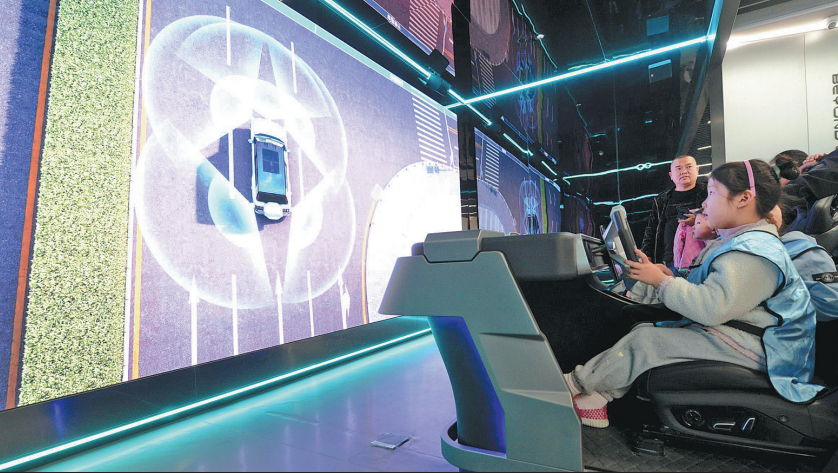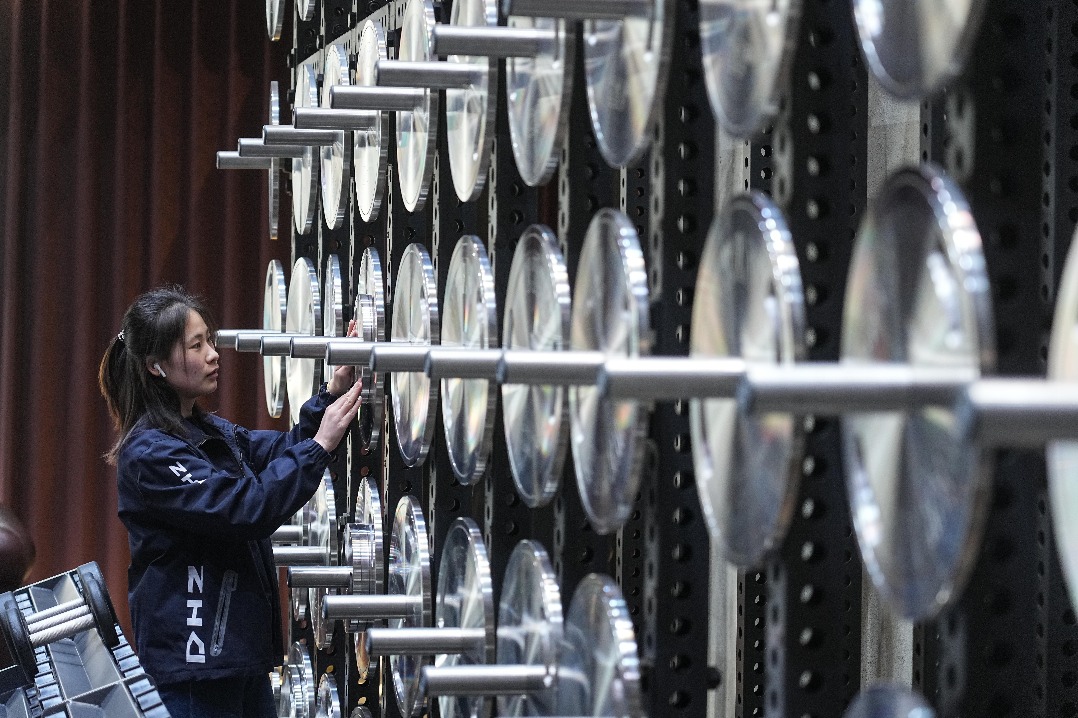Carmakers unleash advanced tech for future edge
Artificial intelligence, autonomous driving in focus


Chinese automakers are racing to integrate into their vehicles cutting-edge technology. From autonomous driving to artificial intelligence-powered cabins, the modern vehicles are being transformed into "the ultimate smart terminals" that fuse advanced mobility, connectivity, and artificial intelligence.
The trend comes as 2025 is widely tipped to be the first year that smart driving becomes a key feature in cars in China, and as the automotive industry enters an era of unprecedented competition in intelligent technology.
Chen Qingtai, chairman of the China EV 100, an auto industry think tank, said: "The pace of intelligent vehicle development in China has exceeded industry expectations. In the first half of 2024, the penetration rate of L2 or Level 2, plus advanced driver-assistance systems in new passenger vehicles surpassed 55 percent."
Level 2 is part of broader standards developed in relation to the degree to which autonomous machines take over driving functions. Level 2 means partial driver assistance. Level 3 means that drivers can afford not to pay attention in certain situations. Level 4 means that vehicles can perform all driving tasks under specific circumstances, but human overrides are still an option.
"In the coming years, basic intelligent features will become universally adopted in newly sold passenger cars," Chen said at the China EV 100 Forum 2025 which was from March 28 to 30 in Beijing.
Zhang Xiang, secretary-general of the International Intelligent Mobility Association, emphasized that advanced driver-assistance systems, or ADAS have become a critical differentiator for carmakers.
"Chip computing power, AI-model-powered applications, and breakthroughs in urban/highway navigate on autopilot, or NOA are key metrics for competitiveness. Automakers mastering these technologies will dominate the market," Zhang said.
BYD Chairman Wang Chuanfu declared 2025 the "Year of Universal Smart Driving", predicting that non-autonomous vehicles will soon become niche products. His words resonate across the industry.
"The pace of automotive intelligence is accelerating, with transformative advancements expected to mature within 2-3 years. Concurrently, China's new energy vehicles currently lead the global market by approximately 3-5 years in both technological innovation and industrial chain capabilities," Wang said.
"It is critical to seize this strategic window, uphold open innovation, and leverage cutting-edge green technologies and products to propel higher-level international collaboration," Wang said.
By capitalizing on complementary strengths and fostering open cooperation, China's automotive sector can achieve global success while driving sustainable growth, Wang added.
Well-aware of the opportunities ahead, Chinese companies, from Huawei to GAC Group, are pushing boundaries to seize first-mover advantages.
Yu Chengdong, head of smart driving solutions at Huawei Technologies Co, said Huawei is ready for level 3 autonomous driving. "From passive to autonomous intelligence, cars are finally awakening," he said.
The remark, seen as a veiled challenge to BYD, underscores the intensifying rivalry.
Huawei's smart driving solutions, already adopted by partners like Chinese car companies such as BAIC and JAC, have positioned it as a leader. Yet competitors are closing in.
BYD recently launched its DiPilot ADAS system, deploying it across 21 models priced between 70,000 yuan ($9,650) and 200,000 yuan — democratizing high-end autonomous features. This disrupts the market's premium-only narrative, experts said.
He Xiaopeng, chairman and CEO of Xpeng Motors, has applauded carmakers including BYD on Sina Weibo, saying that they are helping to popularize smart driving in China and across the world.
Collaboration is accelerating. In January, GAC announced that it would establish a joint project with Huawei to develop luxury smart EVs. "We aim to redefine competitiveness in the NEV sector," said GAC's General Manager Feng Xingya. The partnership reflects a strategic pivot as traditional automakers embrace tech-driven transformation.
Meanwhile, Changan Auto, Geely, Great Wall, BYD and other companies formed an alliance in February to co-develop autonomous technologies. The plan targets full-scenario level 3 autonomy by 2026 and level 4 capabilities by 2028. "This is about creating a 'Chinese smart driving benchmark'," said a Changan executive, speaking on condition of anonymity.
Vice-Minister of the Ministry of Industry and Information Technology Xin Guobin said more efforts will be made to pursue breakthroughs in core technologies like autonomous driving and cross-regional application pilots.
Ouyang Minggao, an academician of the Chinese Academy of Sciences, said that level 4 autonomous driving, powered by advanced AI large language models, will achieve commercial scale in mid-to-high-end vehicles by 2030.
He forecast annual NEV sales to exceed 16 million units in 2025 in China, entering a stable growth phase with annual growth rates moderating. But the total NEV population in China is expected to soar to 100-160 million by 2030.
Zhang Yaqin, foreign academician of the Chinese Academy of Engineering and Dean of Tsinghua University's Institute for AI Industry Research, said unmanned driving will be the largest application for embodied AI in the next five years.
Embodied AI, as highlighted in this year's Government Work Report, refers to AI that is integrated into physical hardware such as robots. It represents a significant leap in intelligent systems capable of interacting with and adapting to their environments, experts said.
Zhang highlighted how generative AI and large language models are accelerating level 4 autonomous driving by addressing challenges like data scarcity, long-tail scenarios, and commonsense reasoning.
While autonomous vehicles will primarily rely on onboard intelligence, Zhang said vehicle-road-cloud coordination will provide critical safety redundancy and enable smart transportation ecosystems.
Zhang also predicted the "ChatGPT moment" for autonomous driving will arrive in 2025, with 10 percent of new vehicles achieving level 4 capabilities by 2030 — ushering in what he termed the "DeepSeek moment" for AI-driven mobility.
Lei Jun, chairman and CEO of Xiaomi, which made a splash in the Chinese crowded car market last year, said during the next five years, Xiaomi expects to invest a total of 105 billion yuan in R&D, and a quarter of its 30 billion yuan R&D investment plan this year will be devoted into AI and its related application in areas such as cars.
Beyond autonomous driving, automakers are waging war over "smart cabins." Chinese EV startup IM Motors, in partnership with Alibaba, debuted its "IM AIOS Ecosystem Cabin," integrating AI agents for in-car interaction.
"AI cabins aren't just about screens — they're about understanding users' unspoken needs," said Yang Dongsheng, who is in charge of BYD's smart driving business. BYD cars, powered by DeepSeek's model, exemplify this shift, enabling vehicles to predict preferences and execute tasks like food delivery via voice commands.
Over 20 brands, including Li Auto and Geely, have adopted DeepSeek's AI to enhance cabin interactions. Analysts predict such integrations will unlock new revenue streams through personalized services and in-car commerce.
As the auto industry's focus is shifting from hardware specs to ecosystem prowess, winning requires mastery of data, algorithms, and cross-industry synergy, experts said.
While BYD and Huawei vie for dominance, startups like Xpeng and Leapmotor see opportunity.
"Mass adoption of smart driving by giants like BYD educates the market — we all benefit," said Zhu Jiangming, chairman of Leapmotor, another Chinese EV startup.
In this hyper-competitive arena, cars are no longer mere vehicles but "third spaces" blending work, leisure, and AI-driven personalization. As 2025 unfolds, one truth is clear: The race to redefine mobility has only just begun, experts added.
masi@chinadaily.com.cn





































